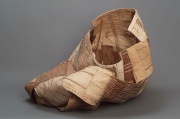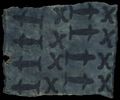Bark
Description
The tough, protective, outer covering on woody stems and roots. Tree barks have had numerous applications over the years. Smooth barks, such as from Birch trees, have been used for paper, boat building, clothing (Tapa), shoes, baskets, and house construction. Extracts from the barks from Oak and Hemlock trees have been used for tanning leather and dyeing cloth. Cork is a light weight, buoyant bark obtained from Quercus suber trees. Other barks provide medicine (quinine), flavorings (cinnamon) and adhesive extracts.
Synonyms and Related Terms
écorce (Fr.); Rinde (Deut.); corteccia (It.); casca (Port.); corteza (Esp)
Additional Images
Resources and Citations
- Mary-Lou Florian, Dale Paul Kronkright, Ruth E. Norton, The Conservation of Artifacts Made from Plant Materials, The Getty Conservation Institute, Los Angeles, 1990
- Matt Roberts, Don Etherington, Bookbinding and the Conservation of Books: a Dictionary of Descriptive Terminology, U.S. Government Printing Office, Washington DC, 1982
- Van Nostrand's Scientific Encyclopedia, Douglas M. Considine (ed.), Van Nostrand Reinhold, New York, 1976
- Random House, Webster's Encyclopedic Unabridged Dictionary of the English Language, Grammercy Book, New York, 1997
- The American Heritage Dictionary or Encarta, via Microsoft Bookshelf 98, Microsoft Corp., 1998





